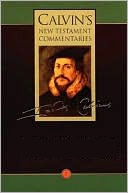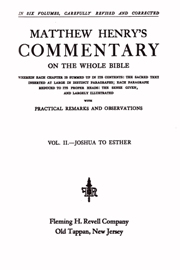|
John Calvin
1509-1564 
Click <here> to read the book online. |
Calvin was a great exegete as well as a superb theologian. His commentaries are
always fresh and relevant, brightly reflecting the glory of God's eternal,
unchanging Word.
|
|
Matthew Henry
1662-1714 
Click <here> to read the book online. |
Originally titled Exposition of the Old and New Testament, this has been one of
the best loved and most highly regarded Bible commentaries for nearly 300
years. Like a true Puritan, Henry combines great exegetical insight with a deep
reverence for God, and a genuine concern for practical application.
|
|
John Gill
1697-1771 
Click <here> to read the book online. |
Spurgeon recommended that his students consult Gill. When you read Gill, you
can understand why... Gill is very incisive and complete, and he time and again
proves himself to be a scholar of the original languages, of the Scriptures,
and of ancient Jewish writings. This massive work is included on the Online
Bible CD-ROM.
Highly recommended! |
|
R. C. Sproul, Gen Ed.
Contemporary 
|
The first Geneva Bible was a pivotal force in the Reformation, opening the
pages of Scripture to readers in the vernacular of the day and providing
helpful notes to assist the laity in understanding its message. The Reformation
Study Bible, under the editorial leadership of reformed scholars such as R.C.
Sproul and J.I. Packer, offers a modern restatement of Reformation truth..
Highly recommended! |
|
John MacArthur
Contemporary 
|
This is an excellent study Bible by an author who is uncompromisingly committed
to the authority of scripture. It provides more depth than other study Bibles,
and is consistently accurate and insightful. My only complaint is with the way MacArthur handles the various passages that teach Particular Redemption (e.g. Romans 8:32; John 10:11,15; Acts 20:28; Matthew 20:28; etc.). In most cases, he does not address the matter at all, even where the passage is quite clear. However, he certainly does teach Particular Redemption in the Study Bible notes. For example, he makes a brief statement at Mark 10:45 affirming the doctrine: ... Christ's substitutionary death on behalf of those who would put their faith in Him is the most glorious, blessed truth in all of Scripture ….One of his clearest affirmations appears at 1 John 2:2 where he writes... for the whole world. This is a generic term, referring not to every single individual, but to mankind in general. Christ actually paid the penalty only for those who would repent and believe. A number of Scriptures indicate that Christ died for the world (John 1:29; 3:16; 6:51; 1 Tim. 2:6; Heb. 2:9). Most of the world will be eternally condemned to hell to pay for their own sins, so they could not have been paid for by Christ. The passages which speak of Christ's dying for the whole world must be understood to refer to mankind in general (as in Titus 2:3,4). "World" indicates the sphere, the beings toward whom God seeks reconciliation and has provided propitiation. God has mitigated His wrath on sinners temporarily, by letting them live and enjoy earthly life (see note on 1 Tim. 4:10). In that sense, Christ has provided a brief, temporal propitiation for the whole world. But He actually satisfied fully the wrath of God eternally only for the elect who believe. Christ's death in itself had unlimited and infinite value because He is Holy God. Thus His sacrifice was sufficient to pay the penalty for all the sins of all whom God brings to faith. But the actual satisfaction and atonement was made only for those who believe (cf. John 10:11, 15; 17:9, 20; Acts 20:28; Rom. 8:32, 37; Eph. 5:25). The pardon for sin is offered to the whole world, but received only by those who believe (cf. 4:9, 14; John 5:24). There is no other way to be reconciled to God.While I cannot agree with his idea that Christ purchased some sort of "brief, temporal propitiation for the whole world" (would this not imply that Christ also purchased a brief, temporal propitiation for Satan and the demons?), his teaching here is basically orthodox and Biblical. I only wish he had made such affirmations in the notes of the passages he cited in support of the doctrine (i.e. John 10:11, 15; 17:9, 20; Acts 20:28; Rom. 8:32, 37; Eph. 5:25). All in all, however, this is
a very good resource with very valuable notes and sound teaching. It is
arguably the best study Bible available.
Highly recommended! |